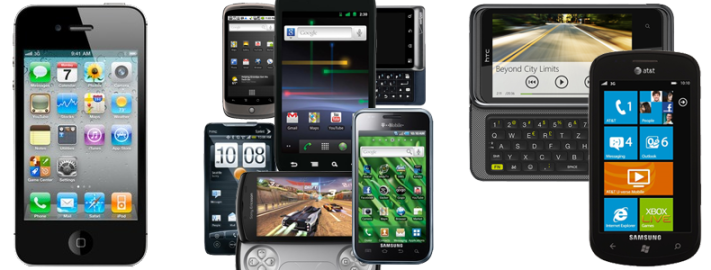I am a firm believer in balance. Balance is the key to creating a product that is to be successful in the long run. Striking a balance in the many aspects of a smartphone is a rather daunting task. However, the various teams behind Windows Phone 7 (or WP7) have risen up and delivered a very promising family of devices. Consequently, I have come to believe that WP7 will be a success in the booming smartphone market. In this article, I will compare WP7 with two of the most prominent smartphone ecosystems today – iPhone and Android.
A Balance in Hardware Choices
Let’s begin with hardware. The Apple iPhone is a single device, with a single set of specifications (ignoring radio hardware differences between GSM and CDMA networks), running iOS. It has a set screen size, display resolution, CMOS camera with an LED flash, the iconic single front button, and various other characteristics. But the key point is the fact that, if a consumer wants a current generation iPhone, there are only two choices to make – the network and the amount of internal storage.
Now consider Android. It is an open source operating system from Google. There are dozens of current generation devices from different manufacturers out on the market, with widely varying hardware specifications for screen size, display resolution, camera, internal and external storage, the presence of a hardware keyboard, processing and graphics capabilities, battery life, and even different versions of the Android operating system and its interface. The plethora of options can easily overwhelm even tech-savvy consumers into analysis paralysis, until they decide that it’s just easier to get an iPhone.
Finally, let’s look at Windows Phone 7. It is an operating system from Microsoft. There are currently nine available devices worldwide from different manufacturers. Many of the hardware specifications are identical, such as display resolution, processing and graphics capabilities, the presence of a GPS, and a standard front button layout. Other hardware specifications differ between devices – physical screen size and technology, the presence of a hardware keyboard, amount of internal storage and a few others. WP7 strikes a balance between the monotony of an iPhone and the confusion of Android.
A Balance in Software Development
Apps can be developed for the iPhone only on an Apple operating system, which generally means that Apple hardware must be purchased. There is a large community of third party app developers, to whom Apple rarely pays attention. All apps that developers submit to the App Store must be approved by Apple, in a process that can take anywhere from a few days to a few months. Apps may be rejected for confusing and even plain inaccurate reasons. Apple reserves the right to reject any app that it finds objectionable in its view.
Android apps can be developed on Mac OS X, Windows, and Linux. There is a community of third party app developers, who are often assisted by Google engineers. The Android Market does not have an app approval process, so any submitted app is approved by default. Google does, however, reserve the right to remove apps if they violate the terms of the Market agreement. Due to the nature of this process, numerous malicious apps have been released and downloaded by unsuspecting users. However, there has been recent news coverage that Google is improving their app policing efforts.
WP7 apps can be developed only on Windows, which most modern Apple computers can run perfectly. There is a community of third party app developers, who are often assisted by Microsoft engineers. The Marketplace has an app approval process similar to that of Apple, save a couple of exceptions: Marketplace apps tend to be approved or rejected in a matter of days to weeks, and the process is more transparent. Again, Windows Phone 7 strikes a balance by rejecting unstable and malicious apps on one hand, and being more open about the process on the other.
Bringing It All Together
As I have been praising the virtues of balance, I must point out that I am biased toward Windows Phone 7. I have been developing apps for it more than for iPhone or Android, although I have worked with all three. Additionally, I enjoy the both the development experience of Visual Studio and the user experience of Metro on WP7 more than the iPhone and Android experiences. Having said that, I still believe that the balance struck by Microsoft with the Windows Phone 7 product will benefit them, as well as the entire WP7 ecosystem, in the long run.


Leave a comment